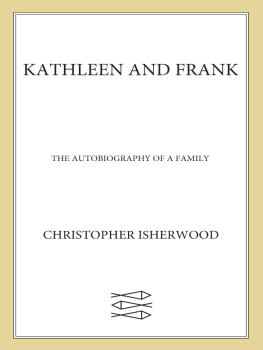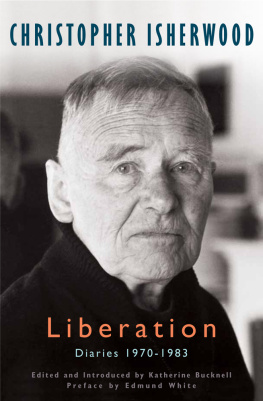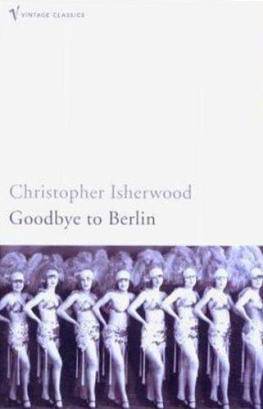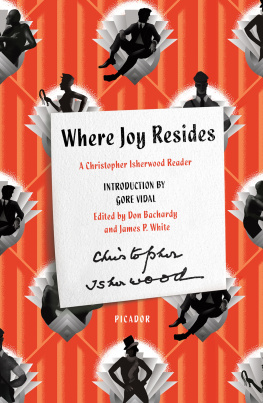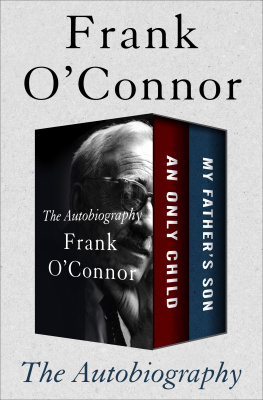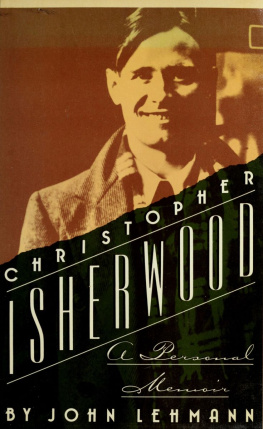Contents
Guide
KATHLEEN
AND FRANK
THE AUTOBIOGRAPHY
OF A FAMILY
Christopher Isherwood
FARRAR, STRAUS AND GIROUX NEW YORK
The author and publisher have provided this e-book to you for your personal use only. You may not make this e-book publicly available in any way. Copyright infringement is against the law. If you believe the copy of this e-book you are reading infringes on the authors copyright, please notify the publisher at: http://us.macmillanusa.com/piracy.
TO KATHLEEN AND FRANK AND RICHARD
Without my brother Richards constant cooperation and exact memory for detail, this book could hardly have been put together. Don Bachardy, always a much valued critic, has been more than usually helpful; as an American, he was able to read this very English story with the eyes of an outsider and tell me when additional explanations were needed. The late Judge J. A. Reid (referred to as Jack Reid in the text) showed great kindness in answering my questions about Franks Army life in Ireland and in copying out extracts from military books in his library. He also put me in touch with Major J. H. Mott, who generously lent me a rare copy of Kearseys history of Franks regiment during the Boer War. Since Judge Reids death, his son John Reid has taken a lot of trouble on my behalf. So has Robert Collison, of the Research Library at the University of California, Los Angeles. My best thanks to them both.
Quotations from the following books are gratefully acknowledged:
A. H. C. Kearsey, D.S.O., War Record of the York and Lancaster Regiment, 19001902, from Regimental and Private Sources.
C. V. Wedgwood, A Coffin for King Charles (called The Trial of Charles I in the British edition).
Beatrix Potter, The Roly-Poly Pudding.
Max Beerbohm, Around Theatres.
Cyril Scott, My Years of Indiscretion.
Colonel H. C. Wylly, C.B., The York and Lancaster Regiment, 17581919.
C.I.
May 1971
At the beginning of 1883, Kathleen started her first diary, probably because she had just fallen in love. But she didnt persevere with it. By the end of July, some days are being missed each week; December is a total blank. Then, for seven years, she didnt keep a diary at allwhich makes it the more astonishing that she began one again when she was twenty-two and kept it regularly for almost seventy years.
From 1891 through 1895 Kathleen used diary volumes which allowed only two pages to a week. In 1896 she changed permanently to a page-a-day diary, with pages that were about three inches by four and a half. Often she would fill the whole page; sometimes she ran over and had to write less for the next day or two, to catch up with the date. Im afraid Im a slave to my diary, she told Richard, her younger son. Kathleen did have a compulsive conscienceshe thought in terms of things-which-had-to-be-done before some deadline daybut her diary wasnt merely another duty. She obviously enjoyed writing it, making time for this among her many occupations, and used it to relieve her feelings in moods of sorrow, indignation or bewilderment. Richard remembers how, when she was an elderly woman, she liked to take out her old diaries and read them to herself, saying that they brought back happier days.
For Kathleen the Past was happier, one might almost say, by definition. Even during her admittedly happy marriage she firmly fixed on one periodthe years at Wyberslegh Hallwhich was henceforth to be recognized as happier than any which could conceivably follow it. She was intensely obstinate in maintaining this attitude. Like every devotee of the Past she could always find reasons why the Present was inferior to it. Franks death became her final unanswerable argument.
Kathleen was careful to be exact about names, dates and even times of day, but she did much more than record happenings, she tried to evoke places and atmospheres, she wrote with a strong consciousness of personal and national drama, of herself and the England she was living in. She saw her own life as History and its anniversaries as rites to be celebrated. She could invest minor domestic events with an epic quality. She discovered a mystic and sometimes terrible significance in coincidences. One can almost imagine her prefacing some of the more portentous entries in her diary with the Biblical formula That it might be fulfilled which was spoken by the prophet
Christopher, her elder son, revolted early and passionately against the cult of the Past. As an adolescent orphan he was subjected to reminders by schoolmasters and other busy bodies of his obligations to the memory of Frank, his Hero-Father. So he learned to hate and fear the Past because it threatened to swallow his future. Later, when this threat had been proved empty and even pathetic, he felt no more than an affectionate exasperation with Kathleen for what seemed to him to be her kind of sulking. He suspected she believed she could actually pressure Fate by it, like a hotel guest who gets better service by refusing ever to admit to the manager that she is satisfied.
Nevertheless, Christopher grew up to become a recorder, too, and so, willy-nilly, a celebrant of the Past; he began to keep a diary and to write autobiographical novels. Today he finds it hard to explain to himself why he never asked Kathleen to let him read her diary while she was aliveperhaps he was still superstitiously afraid of getting entangled in the spiders web of her memories. His failure to express his interest was unkind, in any case, for Kathleen would surely have enjoyed showing it to him, though she never even hinted at this; she had grown so accustomed to hearing Franks talents praised while hers were disregarded that she now thought little of them herself. The last time they met, she was sincerely surprised that Christopher wanted to take two of her own beautiful water colors back with him, to hang in his house in California. And there, all the while, in the drawers of her desk, lay the rows of little volumes of her masterpiece. It was only after she was dead that Richard told Christopher how she had once said, Perhaps someone will be glad of it, some day.
The diary of 1883, scrappy though it is, provides plenty of evidence that Kathleen was already very much Kathleen.
When she began it, she was fourteen years old; she had been born on October the seventh, 1868. She was living at Bury St. Edmunds, Suffolk, with her parents, Frederick and Emily Machell Smith. They often signed themselves Machell-Smith, with a hyphenMachell had been the maiden name of Fredericks motherbut they cant have had any legal right to do so, for they had their daughter baptized Kathleen Machell, thus making sure that the too ordinary Smith would never stand alone.
Frederick had a wine business in Bury, which made him a colleague of Emilys brother Walter Greene, who had a brewery. But Walter was far more prosperous and illustrious than Frederick. He went into politics and in due course became Sir Walter Greene, Bart. In 1883 he already owned a large country house with spacious grounds in the neighborhood, called Nether Hall. Nether was the scene of continuous hospitality: dances, shoots, hunt breakfasts, house parties. On January 1 Kathleen writes in her diary, Back from Paradise to earth, in other words Nether Hall to Bury.
January 11. At six thirty Mum, Puppie and I (in cream dress) start for the Thornhills. Mum wears her velvet. Start home at 12.30 after the most charming time possible. Danced and sat out with A.T. Have turkey and jelly for supper. I wonder if it will be a year before I see A.T. again. I know why I enjoy staying at Nether so much, because of A.T.

